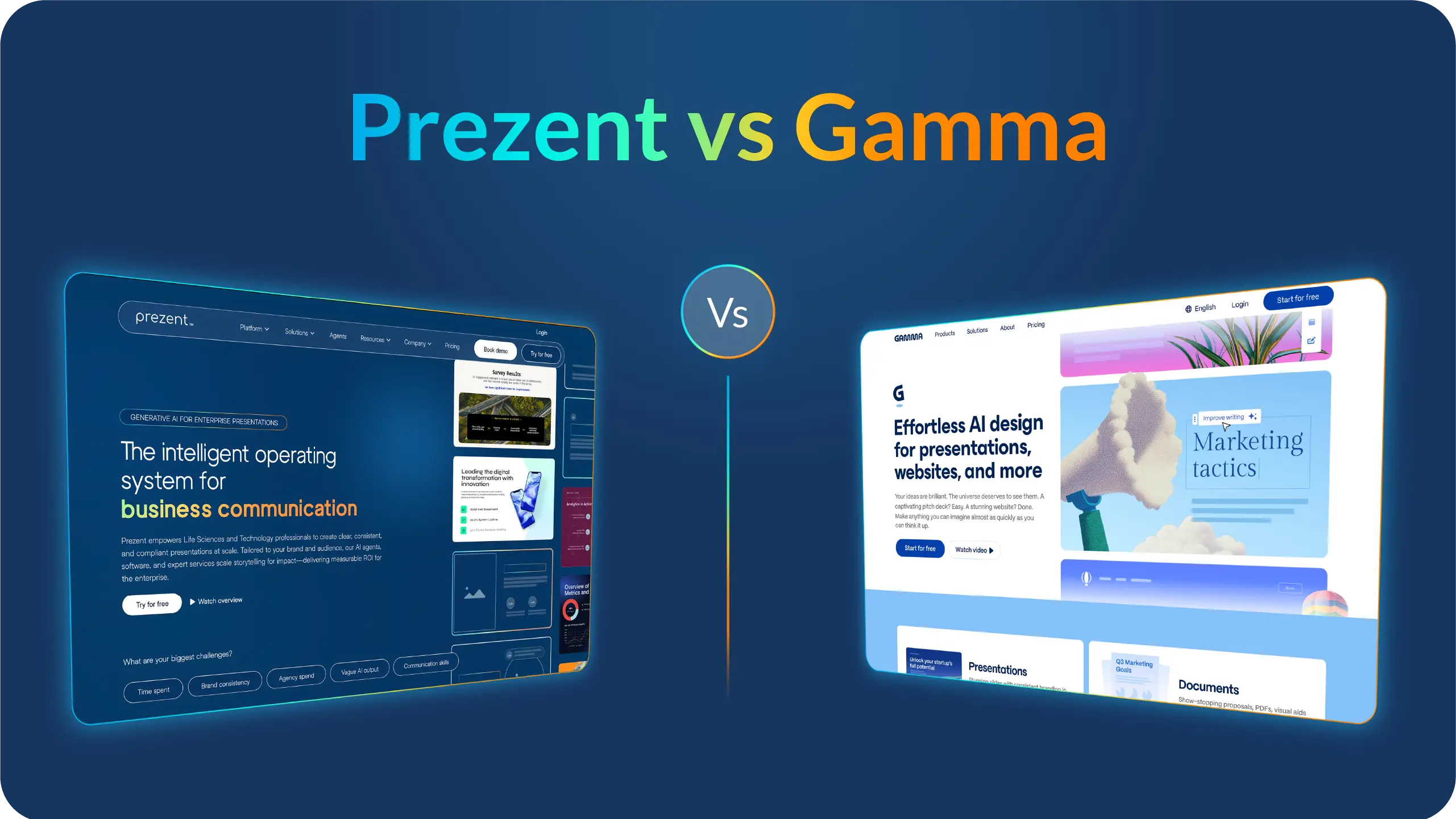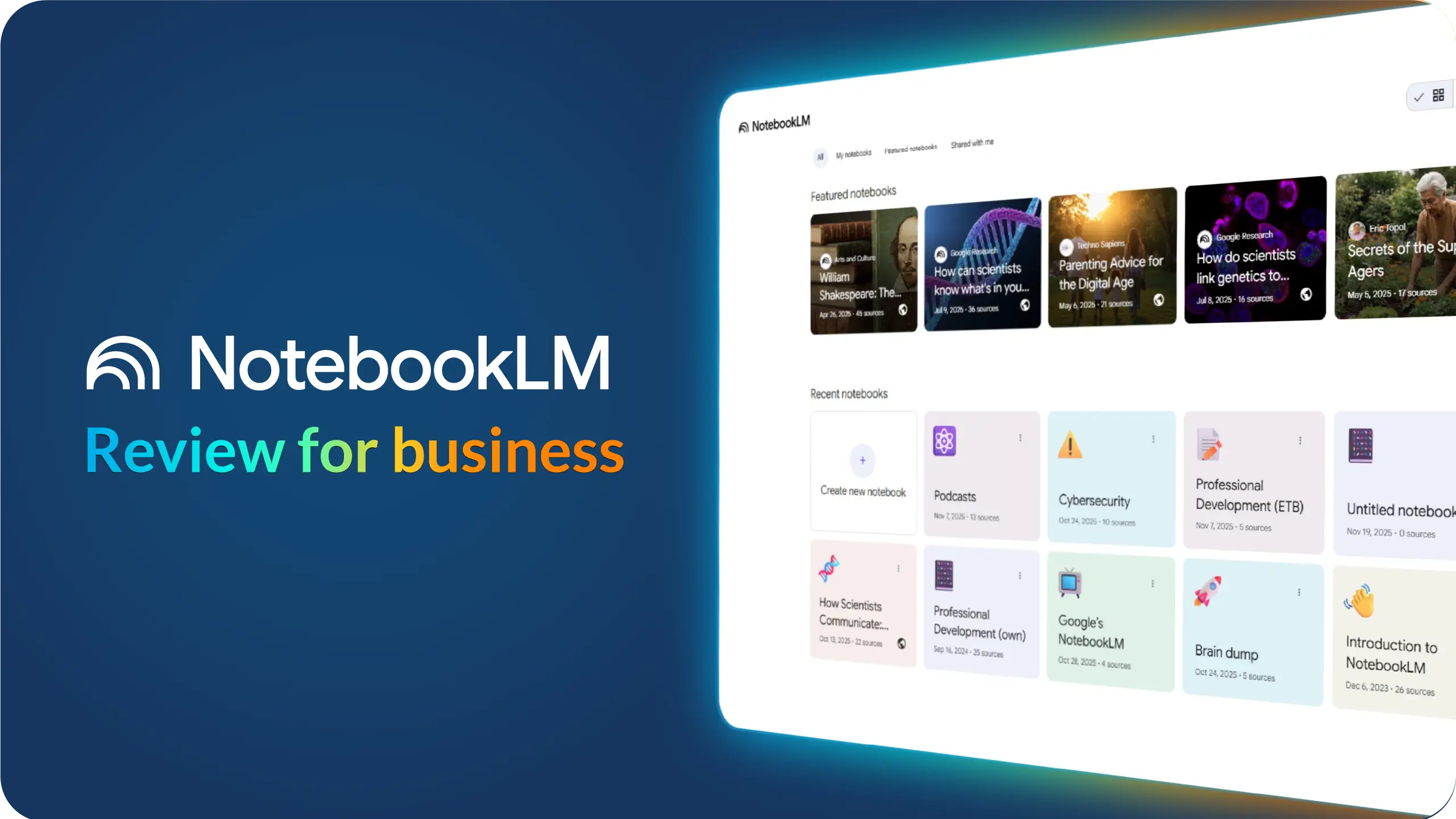Elevate your leadership: The importance of public speaking skills in business

Public speaking is an essential business skill that can give you a significant edge. Every leader engages in public speaking at some point, whether willingly or unwillingly. However, those who have mastered this skill can elevate their business acumen. While many skills contribute to business and leadership success, public speaking uniquely enhances persuasiveness and communication effectiveness.
Despite its importance, around 77% of people fear public speaking. This article will explore the benefits of public speaking, offer public speaking tips to improve your speaking abilities and provide practical advice on overcoming this fear.
Why is public speaking important in business?
Public speaking is relevant across all sectors, including education, politics, business, and entertainment. Any public speech aims to educate, inform, motivate, and influence the audience. Speakers often use visual aids such as multimedia presentations, whiteboards, or simple charts to make their sessions more engaging and impactful.
Public speaking is particularly important in business as leaders frequently must address stakeholders, employees, clients, and prospective clients for various purposes. Here are the key reasons why public speaking is crucial in business:
Establishing connections:
Public speaking allows you to build personal connections with clients, colleagues, and stakeholders. A sales manager presenting a new product to potential clients can create a strong bond by sharing a success story highlighting the product's benefits. This fosters business growth and enhances the speaker's reputation in the industry.
Effective leadership:
Leaders who excel in public speaking can inspire and motivate their teams. A CEO delivering a motivational speech during a company meeting can boost employee morale and drive them to achieve company goals. Effective public speaking helps leaders communicate their vision and rally their teams around common objectives.
Message clarity:
The success of a public speech largely depends on the ability to communicate your message and connect with the audience clearly. Clear communication reduces misunderstandings and enhances efficiency. For instance, a project manager who outlines the project objectives, timelines, and roles in a kickoff meeting ensures everyone understands their responsibilities and the project's direction.
How public speaking skills can benefit you at work?
Public speaking enhances your ability to express your ideas effectively and leave a mark on the audience. Public speaking skills offer numerous advantages in a professional setting. They enable you to communicate your ideas clearly, persuasively, and effectively, ensuring your message is well-received and impactful. Let's look at the specific benefits of public speaking skills at work,
Improved persuasion:
Public speaking allows you to present your ideas in a structured and compelling manner, which is crucial when you need to influence decisions. Whether you're pitching a new project to executives, proposing changes to a workflow, or negotiating with clients, your ability to persuade can significantly impact the outcome. You can influence opinions and drive decision-making processes by presenting clear arguments backed by evidence and confidently delivered.
For example, a marketing director presenting a new campaign idea to the board can use compelling data, vivid storytelling, and a clear call to action to persuade the board members of its potential success. This approach can help secure the budget and resources to launch the campaign.

Builds interpersonal skills:
Public speaking isn't just about presenting facts; it's also about inspiring and motivating your audience. As a leader or team member, your ability to energize and mobilize others can lead to higher morale, increased productivity, and a more collaborative work environment. Public speaking enhances interpersonal skills like empathy, listening, and emotional intelligence, which are vital in any business environment.
Critical thinking skills:
Public speaking skills are essential for effectively handling questions and answers during meetings or presentations. Preparing and delivering speeches sharpens critical thinking and problem-solving abilities. A manager addressing a sudden crisis must quickly analyze the situation and communicate a clear action plan.
Being able to think on your feet, respond confidently, and provide clear and concise answers can reinforce your message and address any concerns or objections your audience may have.
Improved presentation:
A polished presentation style demonstrates professionalism and competence and significantly enhances your professional image. Your presentation style, such as clear articulation, confident body language, and well-organized content, reflects your expertise and attention to detail.
Additionally, an improved presentation style can significantly boost audience engagement, and engaged audiences are more likely to retain information, participate in discussions, and act on your recommendations. This polished image can leave a lasting impression on your audience, setting you apart as a credible and reliable professional.
Effective communication with the team:
You can foster a more inclusive and productive team environment by clearly expressing your ideas and encouraging open communication. Public speaking also plays a role in facilitating team collaboration. Clear communication fosters better collaboration and understanding within teams. A team leader who explains the project scope and expected outcomes can prevent misunderstandings and ensure everyone is aligned. Your ability to present ideas effectively can help align the team toward common goals.
10 Public speaking tips
Public speaking is an acquired skill that can be learned and developed with practice. It is invaluable and greatly enhances one's ability to communicate, connect, and inspire. Emulating the best practices can help you deliver polished, engaging, and professional presentations that resonate with your audience. Having said that here are some tips that can help you excel in public speaking:
1. Know your audience:
Understanding your audience's needs and expectations is crucial for personalizing your message and ensuring maximum impact. Your approach will differ significantly when presenting a financial report to investors from when presenting a new marketing strategy to your team. Therefore, get to know your audience better by learning about their background, understanding of the topic, and challenges and concerns. Your content will resonate more effectively with your audience when you understand them well.
2. Organize your content:
Structure your presentation logically, with a clear beginning, middle, and end. Outline key points and support them with relevant data and stories. A structured and logical approach helps you build a storyline around your topic. This will not only keep your audience engaged but will also help them retain the information better.
3. Be authentic and clear:
Authenticity is a vibe that people can sense when you speak to them. Try to be clear and genuine during your public speeches. If you don't know the answer to a question, acknowledge it honestly and offer to find out rather than providing inaccurate information. Avoid jargon, excessive details, and complex data points. By being genuine and honest in your delivery, you'll find it easier to build a connection and win over your audience.
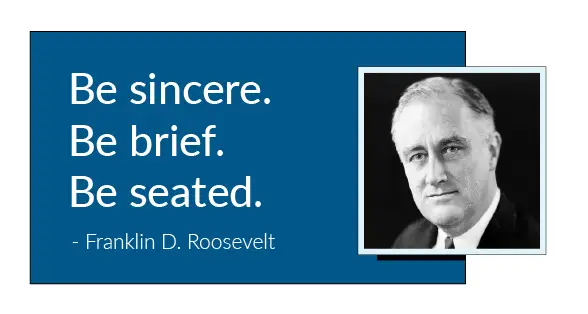
4. Delivery techniques:
In public speaking, not only does the content matter, but the delivery is equally crucial. Studies suggest that only 10% of information is conveyed through spoken words, while the remaining 90% is communicated through non-verbal cues and tone of voice. This significant statistic highlights the importance of refining your delivery techniques, including vocal variety, body language, and pacing, to engage your audience effectively. Dynamic speakers modulate their tone, volume, and pace to maintain interest and emphasize key points.
Here are some useful tips to help you enhance your speech delivery:
- Slow down: Speak at a pace that allows the audience to follow and understand you clearly.
- Modulate your voice: Use changes in volume and tone to express yourself and keep the audience engaged.
- Smile appropriately: Smiling conveys welcome and inclusion, making you appear approachable and friendly.
- Project confidence: Maintain good posture by opening your chest, keeping your arms relaxed, and straightening your spine.
- Use positive gestures: Employ gestures like mirroring or nodding and avoid aggressive or inappropriate movements.
- Make eye contact: Engage with various audience members to form personal connections.
- Utilize space: Move confidently within the space to emphasize important points but avoid excessive movements.
5. Connect with your audience:
Personal stories are a powerful way to connect with your audience. Sharing relatable experiences builds rapport and makes your message more memorable. Your stories can demonstrate credibility and illustrate your message, making it more engaging and impactful.
To effectively connect with your audience through personal stories, choose relatable experiences that align with their backgrounds and interests. Be descriptive, but keep your story concise and to the point. You also have to ensure your story supports the main message of your presentation by making clear connections.
6. Adapt your speech:
Your speech might not go exactly as planned, so it's crucial to be prepared to adjust your presentation based on audience feedback and engagement levels. Flexibility and responsiveness can help you maintain the audience's interest and effectively convey your message. Here are some strategies to help you adapt on the go during a public speech:
- Read the room- If you notice signs of disengagement, such as fidgeting or lack of eye contact, it’s time to adjust your approach.
- Inject humor- If the audience seems bored or uninterested, lighting the mood with a relevant joke or amusing anecdote can re-engage them.
- Engage your audience- Invite questions or comments to make the presentation more engaging. You can also incorporate interactive elements like polls, quizzes, or small group discussions.
- Adjust the content- Be prepared to skip over less critical sections or elaborate on points that resonate more with the audience.
7. Prepare, Prepare, Prepare:
Practicing your speech prepares you to face the audience. As Steve Jobs's practices demonstrate, to excel in public speaking, it is essential to rehearse thoroughly and methodically.
Jobs approached his presentations with the precision of a theatre artist, starting his rehearsals early and refining his speech and gestures. He practiced out loud, often in full presentation mode, and sought constructive feedback from his team to perfect every element.
By simulating real-life conditions during rehearsals, Jobs ensured his presentations were seamless and impactful. Therefore, practice your speech multiple times, but avoid memorizing it word-for-word. Familiarity with your material allows for a more natural delivery. Rehearse in front of a mirror or record yourself to identify areas for improvement.
8. Use effective technology:
Visuals are essential for keeping the audience engaged and effectively delivering information. Research indicates that 65% of the population are visual learners, as the brain processes visuals 60,000 times faster than text. Therefore, speakers must incorporate impactful visuals into their speeches.
Use multimedia elements such as slides or videos to enhance your presentation. Tailor your use of technology to the setting, whether a formal business meeting or an informal team discussion. A well-designed slide deck can highlight key points and maintain audience engagement throughout the presentation. By leveraging effective technology, speakers can enhance the effectiveness of their message and ensure audience comprehension and retention.
9. Exhibit confidence:
According to research, listeners take only half a minute to decide if you are trustworthy and what you say is important. Confidence is key to owning the floor and presenting with assurance and composure. Here are some strategies to exhibit confidence in your speech:
- Vary your pace while speaking to emphasize important points and maintain engagement.
- Avoid using filler words such as um, ah, and like.
- Take pauses where necessary to emphasize key messages.
- Make eye contact to establish trust and demonstrate confidence.
- Maintain an open posture while speaking and avoid defensive postures like crossing arms.
- Use appropriate gestures using hands and facial expressions, but avoid overdoing them.
10. Seek feedback and reflect:
Improvement is a constant process, so every time you give a speech, take feedback from your peers and work on areas that need improvement. Focus on constructive feedback to stay motivated rather than getting demotivated by negative comments. Continuous learning and adaptation are key to becoming a better speaker. Below are some effective techniques to help you assess and enhance your presentations:
- Recording your speech is useful for self-assessment and analyzing your strengths and weaknesses.
- Idealize compelling speakers who serve as industry benchmarks and compare your speech with theirs to understand what makes a presentation effective.
- Seek feedback from peers, mentors, and friends to refine aspects such as body language, vocal variety, and overall delivery.
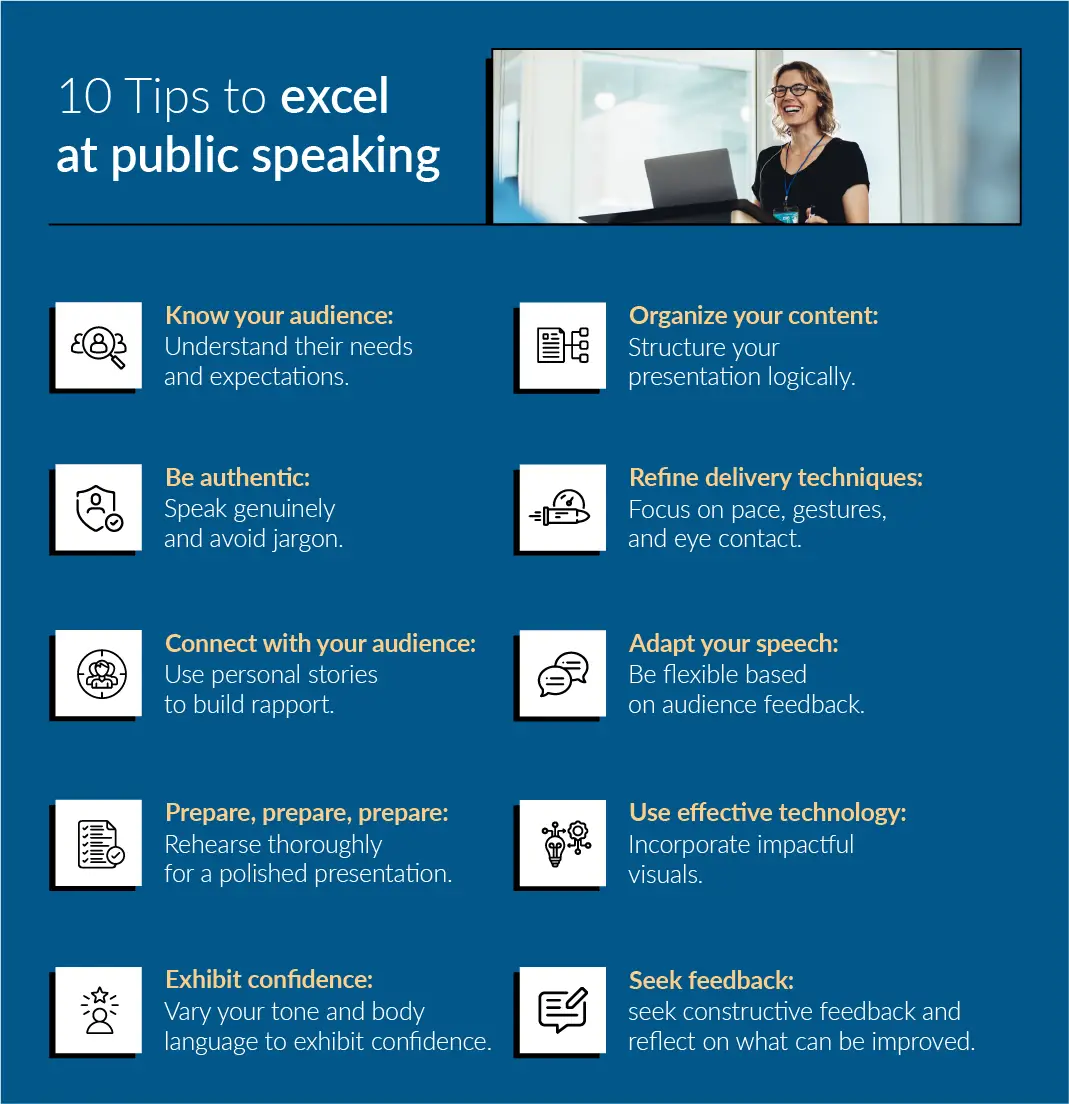
How do you overcome the fear of public speaking?
Research has presented shocking data that says that death is the number two fear that people have, and public speaking is the first. But the good news is that there are effective ways to manage nerves when delivering a speech or presentation. Here are some practical tips recommended by experts:
Acknowledge your feelings: Understand that nervousness is normal and accept your emotions. Recognize that nervousness can sometimes indicate excitement, and feeling this way is okay. Remind yourself that despite feeling nervous, you can deliver a successful speech.
Shift your focus: Instead of dwelling on your anxiety, remind yourself that your audience is primarily interested in the content of your presentation rather than critiquing you personally. Shifting your focus to the value of your message can help alleviate some of the pressure.
Engage your audience: Start your speech with a discussion question to encourage audience participation. Dialogue rather than delivering a monologue can help you feel more relaxed. Maintain eye contact with individuals in the audience to establish a connection and boost your confidence.
Practice regularly: Practice your speech delivery multiple times, preferably in the actual setting where you'll be speaking. Seek feedback from friends or colleagues to refine your presentation. Rehearsing in front of others can also help reduce anxiety and increase confidence.
Utilize calming techniques: Explore various calming techniques, such as deep breathing exercises or visualization, to help manage stress during your presentation. Experiment with different methods to find what works best for you and incorporate them into your preparation routine.
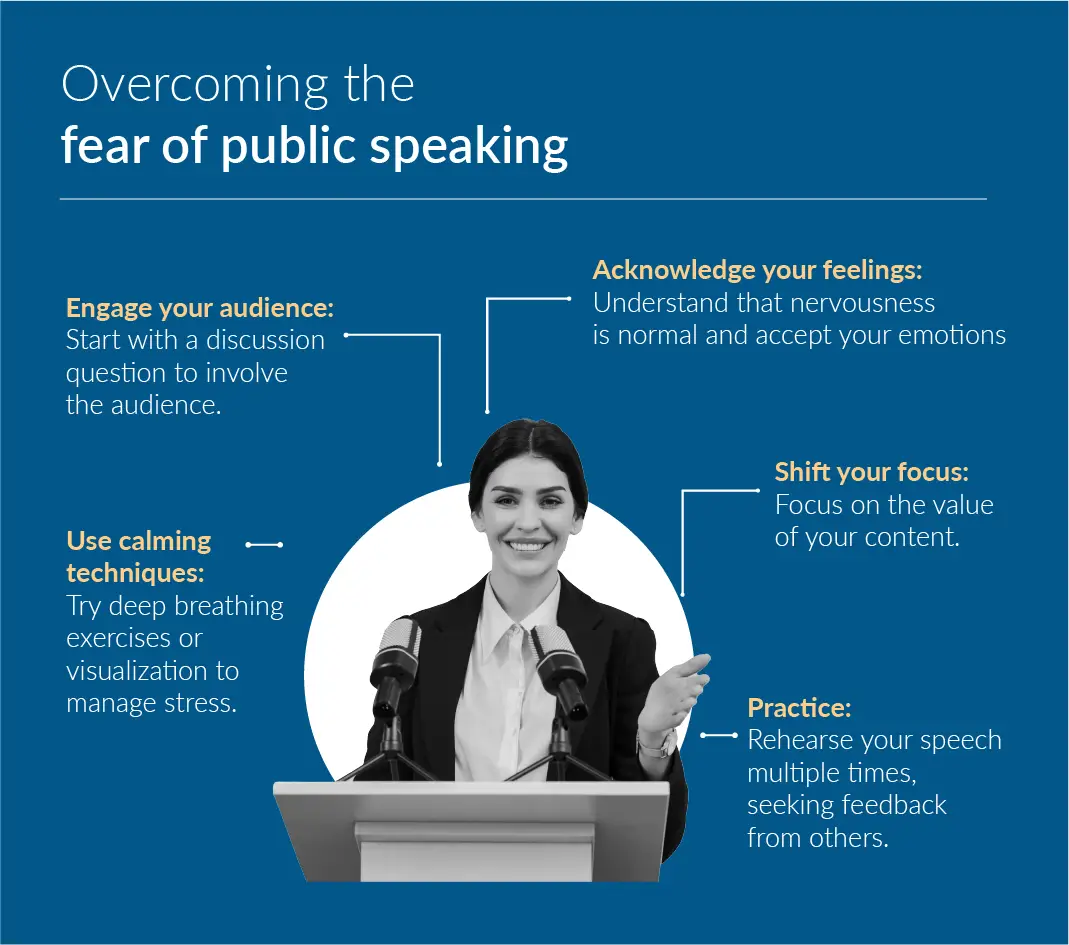
FAQ on public speaking
1. How can a public speaker improve their skills?
Improving public speaking skills involves continuous practice and feedback. Take courses, such as those offered by Coursera for Business, to enhance your skills. Participate in speaking engagements to gain experience. Ask for feedback from your audience and peers after each presentation. Join organizations like Toastmasters International for structured practice and support.
2. How can public speaking skills benefit me in the workplace?
Public speaking skills are essential in the workplace for effective communication. Speaking confidently in front of a group can help you lead meetings and presentations. Good communication skills enhance your ability to clarify ideas and execute projects. Employers value employees who can speak clearly and persuasively. Participating in public speaking situations can also improve your leadership skills.
3. What resources are available for learning public speaking?
There are numerous resources to help you improve your public speaking skills. The University of Washington offers an introduction to public speaking course. Online platforms like Coursera provide access to specialized learning programs. Books and lectures by experts like Craig N., Ph.D., can provide valuable insights. Nonprofit organizations like Toastmasters International offer hands-on practice and support. You can also take advantage of financial aid and online degree programs for more structured learning.
4. How can I overcome mistakes during a speech?
Making a mistake during a speech is common and not the end of the world. Acknowledge the mistake briefly and continue with your presentation. Preparation, such as practicing with a microphone or at a podium, can help you feel confident. Use the first 30 seconds of your speech to establish a direct connection with your audience. Remember that even experienced speakers, including those at TED talks, may make mistakes. The key is to stay calm and keep engaging with your audience.
Become an excellent speaker with Prezent:
Prezent can significantly prepare you to deliver outstanding presentations and public speeches. Our tailored solutions help you excel every time you step in front of an audience. Our comprehensive approach will give you the skills and confidence needed to deliver powerful, engaging, and impactful speeches and presentations. Here’s how Prezent can enhance your speaking abilities:
Zenith learning workshops: Participate in workshops designed for various skill levels and interests. These live sessions are led by seasoned experts, providing practical experience and personalized feedback to help you continuously improve your public speaking skills.
Guides: Access our e-learning platform with easy-to-digest resources on problem-solving, presentations, and visual storytelling. Build your skills quickly and fit learning into your busy schedule.
Efficient presentation building: Create engaging and impactful presentations in 50% less time with Prezent. Utilize over 35,000 expert-curated slides and more than 1,000 storylines tailored to various business scenarios to enhance your speeches with captivating visuals.
Explore all AI features of Prezent by scheduling a demo at your convenience, and our experts will show you how Prezent AI can enhance your business communication efficiency. Alternatively, you can explore the platform yourself with a free trial.




.png)
